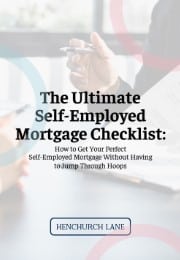Mortgage for Company Director on PAYE
- Friendly expert mortgage advisers
- We work with dozens of lenders
- Access to competitive rates
Home » Mortgage for Company Director on PAYE

Mortgage for Company Director on PAYE
Paul Holland explains all about mortgages for Company Directors on PAYE.
Can you explain what a company director on a PAYE is? Is it difficult to get a mortgage as a company director on PAYE?
A company director always has the option to pay themselves via the PAYE system. They also have the option to pay themselves with dividends, and most will likely take a combination of the two.
A very common setup is to have a small salary that doesn’t trigger high national insurance payments, then the rest of the income is paid with dividends.
Regardless of how they choose to remunerate themselves, if directors own more than a 20% or 25% share of the business, depending on the lender, they will be treated as self-employed.
We all know it’s more difficult for a self-employed applicant to secure a mortgage. But if they don’t own shares within the business, they’ll be treated as employed.
There can be some misconception with applicants sometimes, whereby they think because they’re fully PAYE within their company, that they’ll be treated as employed. It’s not the case. If you effectively are the business, you will be treated as self-employed.
Can I still get a mortgage if I am a Company Director on PAYE and I only have one year’s accounts?
If you’re a shareholding director, then securing a mortgage with just one year’s worth of accounts is the same process as for any other self-employed person. It is possible. We do it regularly for our clients.
You’ll only have access to a limited number of lenders who allow one year’s accounts. Of course, you’ll also need good credit status and a deposit. But yes, if you’ve got a year’s worth of accounts submitted to HMRC, regardless of how you pay yourself through your limited company, you should be in a position to secure a mortgage.
How will lenders assess my income as a Company Director on a PAYE? How is affordability calculated?
There are two ways a lender will assess a Company Director’s income if you own more than 20% or 25% of the business. The first way is by using your salary and your dividends. If you are fully PAYE, they’ll just use your salary.
They normally average that out for the latest two years, unless the trend is in a downward direction. If it’s going down year to year, they’ll take the most recent year. If you’ve only been trading for one year, we can approach lenders that would just use that one year of trading.
The other method is using your salary plus your share of the net profit. If the business has got profit left in the business each year, that can be a game changer from an affordability perspective. Once we’ve figured out what that income number is, the rest is very similar to an employed applicant.
What documents do I need to prepare?
This again, is where misconceptions can come in. People think they just need three pay slips because they are fully PAYE. Again, it’s not the case.
If you’ve got those shares within the business, it’s going to be based on your company history. We’re going to need your latest two years’ company accounts, latest two years’ SA302s – also known as tax calculations – and your latest two years’ corresponding tax year overview documents. You’ll only need one year if you’ve been trading for less than two years.
You’ll also need your latest three months’ bank statements, personal ones and business ones, and then two sets of proof of address, photo ID, and your proof of deposit. That’s pretty standard for everyone.
What if my pay slips are not considered as PAYE income?
This question is about company directors not being considered employees, even if they are on PAYE only pay. As we’ve mentioned, there can be confusion within the mortgage world where limited company owners think they’re an employee from a technical point of view and according to HMRC.
But a mortgage lender won’t view you as an employed applicant. If you own more than 25% of the business, every lender will assess your income as a self-employed person.
In short, at least one year’s worth of business accounts must have been submitted to HMRC. You can’t just start paying yourself a salary of £100,000 a year and then next month get a £400,000 mortgage.
How much can I borrow and what deposit will I need?
From a maximum loan perspective, income calculators are very similar across the board. The difference lies in how each lender will arrive at the income figure that’s entered into the calculator.
If you own a business, the most common method is to average out the latest two years, or take the lower if it’s on a downward trend. They’ll either use a combination of salary and dividends or salary and share of net profit, depending on the lender you approach.
Once they’ve worked out that figure and punched it into the calculator, it’s very similar to any other applicant. They apply a multiplier to your income, and subtract your commitments off the maximum loan amount to come up with a borrowing total for you personally.
Can I get a Buy to Let mortgage as a Company Director on PAYE? Any differences?
You can. You can get a Buy to Let mortgage with no income at all. Buy to Lets are assessed using the rental income from the property.
Some lenders have a personal minimum income level, but some don’t. If you’re looking to invest in a Buy to Let property and you have access to a deposit and a half decent credit status, start making enquiries as soon as you can. There’s a good chance you could secure something.
How does bad credit affect me getting a mortgage as a Company Director on PAYE?
Exactly the same as everyone else. Good credit normally means better rates. Impaired credit can either mean higher rates or a mortgage decline, depending on just how bad it is.
Every lender is different, so the best thing to do is download a multi-agency credit report and speak to a broker. Even if you can’t secure something right now, any decent broker will explain changes to make and give you a plan to get yourself in a better position.
How does remortgaging work as a company director on PAYE?
If you follow what we’ve already been through and take that all on board, you’re not going to go wrong. A remortgage application is the same as a purchase application.
If you’ve made changes since you last did your mortgage and you think that might be a hindrance to you, rather than remortgage, you could look at a ‘product switch’ with your existing lender.
This will effectively get you a new rate without having to have a full income assessment. That can really help when it comes to the end of your current fixed rate. It’s going to avoid you falling onto the dreaded standard variable rate, which is going to be around 8% or 9% [podcast recorded in March 2024].
You don’t always have to move lenders. If your income doesn’t allow that, a product switch might be a better approach for you, until your accounts get to the position where you can start to approach new lenders for deals.
How can a mortgage broker help in this instance?
We deal with company directors all the time. Some of them will naturally assume because of their situation that things are difficult. They get overwhelmed and make quick decisions about how they pay themselves. A lot of the time, it overcomplicates things.
I would say before you start making big changes when it comes to finances, company set-ups and income, it’s worth having a chat not only with a broker, but with someone that specialises within the self-employed world.
Some people have spoken with other brokers and have unfortunately been given the wrong advice. They’ve made big, unnecessary changes and ended up potentially paying more tax or being in a less ideal situation as a result.
It is a really complex world for director mortgages and the self-employed in general. As we always say, preparation is key, speak to a broker… but it doesn’t hurt to say it again because it’s only going to benefit you in the long run.
We deal with people all the time that really could have made better progress by speaking to someone sooner. So do get some advice early on in the process.
YOUR HOME MAY BE REPOSSESSED IF YOU DO NOT KEEP UP WITH YOUR MORTGAGE REPAYMENTS.
Why Us?
- Friendly, expert mortgage advisers
- We work with dozens of lenders
- Access to competitive rates

